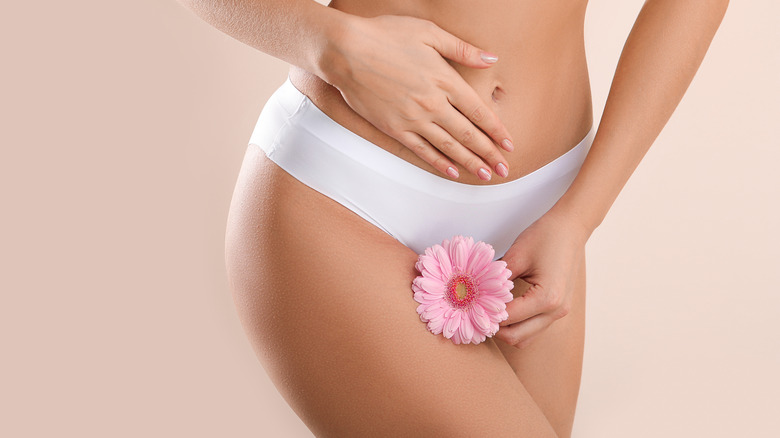Myths About Feminine Hygiene You Need To Stop Believing
Similar to other health-related information, there are many myths surrounding feminine hygiene that simply aren't true. Most products that claim to improve your feminine hygiene do anything but. In fact, the term "feminine hygiene" is itself a myth and marketing plot. The term was developed to make women feel ashamed about their genitals so they will buy feminine hygiene products, according to Healthline.
However, that doesn't mean that females shouldn't be prioritizing vaginal health. Far from it. It just means that women need to become knowledgeable about the myths surrounding feminine hygiene, and learn about what works and what doesn't. For example, simple products work the best. Many women believe that they need fancy products for good feminine hygiene, but that's not true, according to Mayo Clinic.
In fact, the vagina cleans itself. The vulva can be washed easily with warm water, though you can also use mild unscented soap around the folds, notes Healthline. Douches, deodorants, perfumes, and sprays are not only unnecessary but can be actively harmful. For example, douching is associated with a higher risk of yeast infections, pelvic inflammatory disease, ovarian and cervical cancers, and ectopic pregnancies, warns Reuters.
There are many other incorrect ideas surrounding the health of female genitals, but here are two of the biggest myths about feminine hygiene you need to stop believing.
Myth: What underwear you choose is not important
Many female underwear manufacturers want women to believe that the underwear they wear isn't important in terms of their health. That's far from the truth. Wearing underwear made of silk may make a woman feel more confident (more power to them), but they also are not breathable and usually trap moisture, according to SOG Health. Synthetic materials can create chafing, possibly leading to yeast infections.
Instead of synthetic materials like nylon, polyester, or silk, try to wear white panties made from 100% cotton. They may not be the sexiest, but they are the healthiest option, absorbing moisture and allowing your vagina to breathe, according to Mayo Clinic. Also, it's best not to wear thongs and tight-fitting nightwear. Instead, consider wearing no underwear to bed and wearing loose-fitting pants or skirts if possible. Finally, make sure to wash your panties separately from other clothing, using a mild detergent.
Myth: Discharge from the vagina means yeast infection
It may seem like any discharge from your vagina means that something is wrong. After all, why would discharge be occurring for no reason? However, vaginal discharge is almost always completely normal and serves many important functions to the health of your vagina. These functions include cleaning and moistening the vagina, preventing and fighting infections, removing bacteria and dead cells, and making sure that your vaginal microbiome is balanced, according to SOG Health.
While vaginal discharge itself is normal, you should still keep an eye on other symptoms that may indicate a yeast infection. If you are having vaginal discharge that is accompanied by itchiness, discomfort, or burning, or the discharge is thick, white, and odorless (similar to cottage cheese), you may be experiencing a yeast infection, according to WebMD. Yeast infections are extremely common, with 75% of women experiencing at least one during their lifetime. Your doctor can provide a treatment plan.



